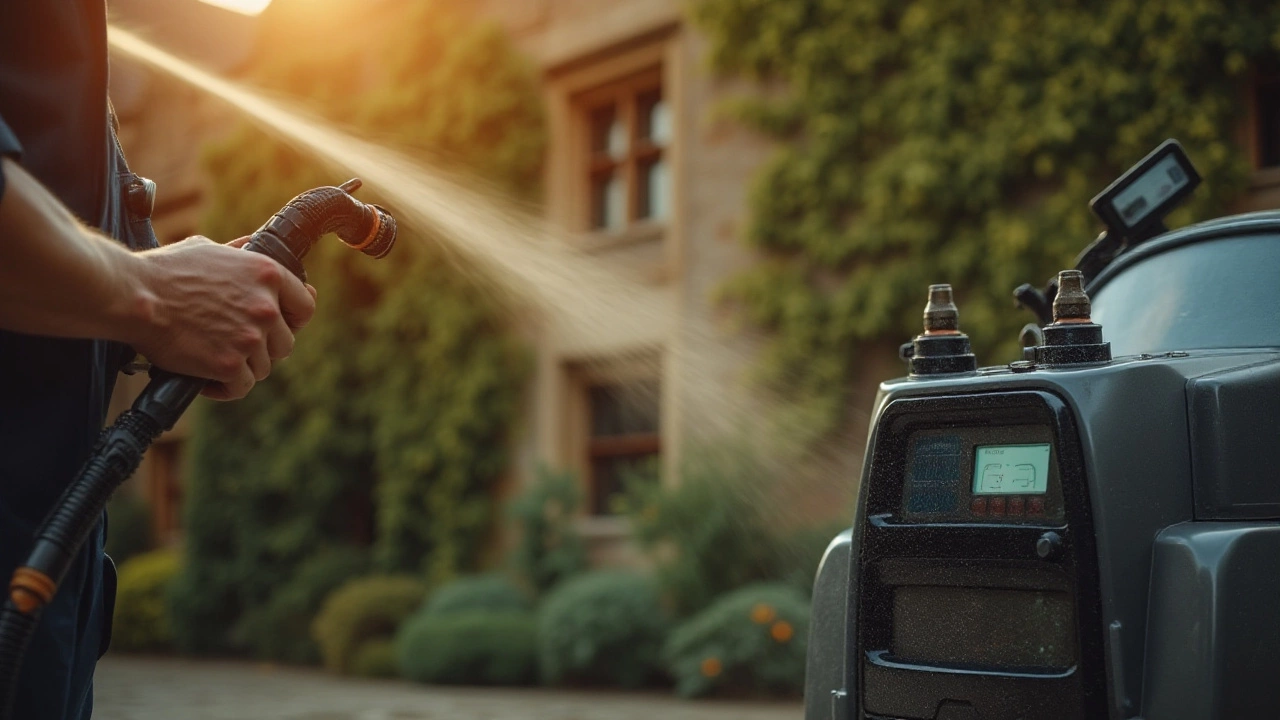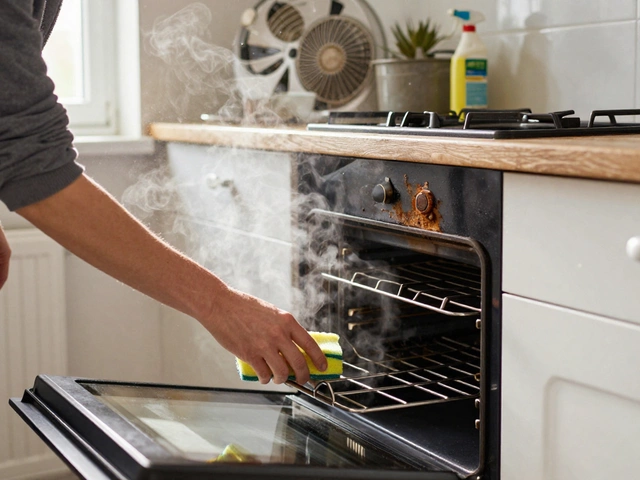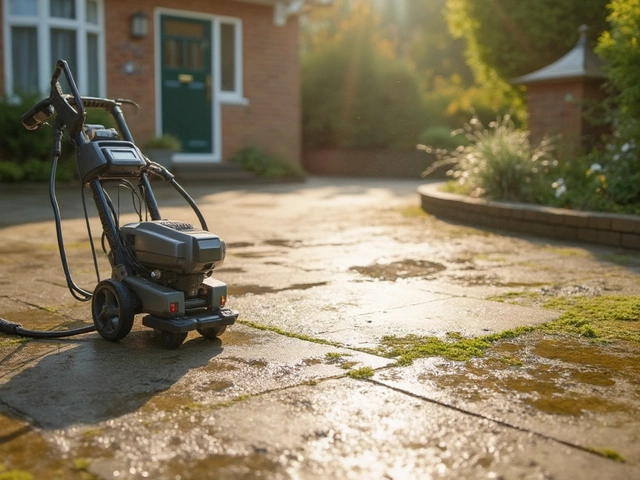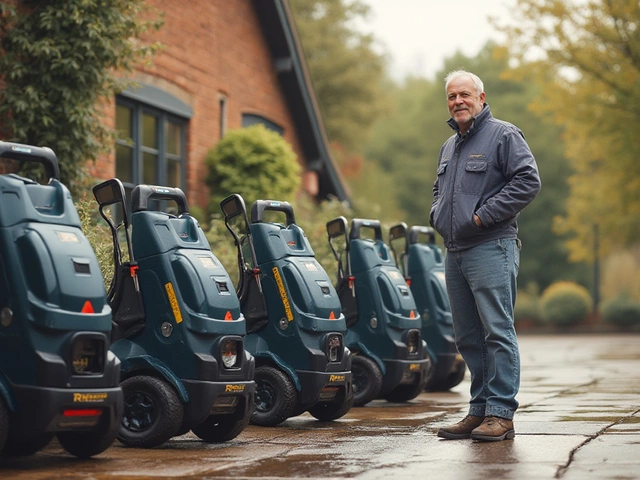Pressure washing is a crucial task in many cleaning projects, from the grimy facades of commercial buildings to the oil-stained driveways of residential homes. Professionals in this field rely heavily on their equipment to get the job done right. But what type of pressure washer do experts choose when precision and power are non-negotiable?
The right pressure washer can turn a tedious cleaning task into a surprisingly swift and satisfying process. Professionals typically opt for models packed with features that enhance performance and reliability. In this article, we delve into the different types of pressure washers that are a staple in the toolkit of cleaning experts. Whether you’re tackling outdoor patios or commercial properties, understanding these tools will guide you in selecting the best equipment for your specific needs.
- Understanding Pressure Washer Basics
- Popular Pressure Washer Types Among Professionals
- Key Features Professionals Look For
- Tips for Choosing the Right Professional Pressure Washer
- Maintenance and Safety Tips for Professional Use
Understanding Pressure Washer Basics
Diving into the world of professional pressure washers might seem daunting at first, but the basics are easier to grasp than one might think. A pressure washer is a high-pressure mechanical sprayer used to remove loose paint, mold, grime, dust, mud, and dirt from surfaces and objects such as buildings, vehicles, and concrete surfaces. Powered by electric motors or gas engines, they are designed to offer optimal cleaning power. The intensity of a pressure washer is measured in PSI, or pounds per square inch, which indicates the force at which water is being expelled. For professional cleaning results, units with PSIs ranging from 2000 to 4000 are standard, offering both flexibility and power for a multitude of tasks.
Another critical consideration is the GPM, or gallons per minute, which measures the flow rate of the water. Higher GPM means the pressure washer can clean a larger area in less time, making it essential for large projects. A sturdy machine might offer around 2 to 4 GPM. Pairing a high PSI with a considerable GPM is what provides that commercial-grade results that professionals seek. When shopping for a unit, reputable brands such as Kärcher, Simpson, and DeWalt often headline the wishlist. Notably, these brands have consistently proven reliability and performance through their high-quality components and technological advancements. A myth buster for you: using a pressure washer conserves water compared to using a standard garden hose. Pressure washers use around 80% less water, which can be a significant incentive for environmentally conscious consumers.
Pressure washers come in two main types: electric and gas. Electric pressure washers are lighter, quieter, and require less maintenance. They deliver enough power for most residential jobs and smaller commercial tasks. Gas-powered units, on the other hand, are favored by professionals. They produce more power, are more mobile and don’t depend on a power cord, making them ideal for larger projects. They do tend to be noisier and require more maintenance, but their power potential often tips the balance in their favor. Choosing between electric and gas involves consideration of one's typical cleaning tasks and frequency of use. Ultimately, the choice depends on personal needs and the type of surfaces being cleaned.
"Understanding the basic components and metrics of a pressure washer can lead to significantly better results for both beginners and seasoned pros," says Chris Poole from the Ultimate Cleaning Guide. "A wise choice pays off in efficiency and longevity of the equipment."
Beyond the type of power source, accessories and attachments play a significant role in the versatility of a pressure washer. Turbo nozzles, surface cleaners, and extension wands could become handy tools. For instance, nozzles come in different degrees, determining the spray angle and intensity, from pinpoint settings for stubborn grime to wide-angled sprays for broader coverage. These attachments maximize the washer's capabilities, catering to various surfaces and dirt levels. Maintenance is equally vital; regular checks and cleaning of filters, hoses, and pumps can greatly extend a pressure washer's lifespan. A quick maintenance routine includes checking for proper oil levels, looking for leaks and signs of wear, and keeping the system free from clogs.
Popular Pressure Washer Types Among Professionals
In the bustling world of cleaning, professionals are particular about their tools. Choosing the right pressure washer is less about cost and all about functionality. The distinction usually starts with power sources: gas and electric. Both have their champions, and it's essential to comprehend their strengths.
Gas-powered pressure washers make waves in environments where robust cleaning is mandatory. Their high power output allows them to obliterate the toughest stains on commercial and industrial sites. The ability to operate without electrical cords, often a hindrance on large properties, is another distinct advantage. However, they aren't as clean as their electric counterparts, producing emissions that make them less suitable for indoor use. These tools roar to life with horsepower that ranges from two to 13, delivering up to 7000 PSI in some models. For many business owners looking to cater to a broad spectrum of outdoor cleaning tasks, gas models remain a staple.
The pressure of water does wonders, not just by saving time and effort, but it also soothes the very soul of everyday labor. - A seasoned pressure washer professional
On the other hand, electric pressure washers are gaining popularity for residential and lighter commercial use. Professionals choose electric washers for their compact size and ease of maintenance. Clean and quiet, these machines often top out at around 2000 PSI, making them ideal for delicate surfaces and detailed work around storefronts and homes. They're also more cost-effective and eco-friendly. A critical factor for many professionals is their compatibility with a standard electrical outlet, removing reliance on gasoline and cutting running costs.
Both types carry their strengths into various niche applications, and this is where specialized machines come into play. Hot water pressure washers, for instance, apply the science of thermal cleaning. The heat loosens grease and dirt more effectively when compared to cold water alone, which makes it a favorite in the food service and automotive industries. When combined with high-pressure output, these machines turn cleaning into a process akin to literal magic, effectively cutting grease and sterilizing surfaces.
Another category professionals often lean into is the commercial-grade electric and diesel-powered washers. These hybrids deliver uncompromising power and are designed for continuous use over long periods. With stainless steel components that withstand corrosion and pumps that run for hours, they're indispensable to cleaning contractors handling severe conditions or working in remote locations lacking power outlets. Many such advanced models even include sophisticated recovery systems that collect wastewater, an intricate feature especially relevant when environment-friendly practices are in place.
Ultimately, professionals balance their choice of a pressure washer on considerations beyond the apparent power and fuel type. They look at factors like portability, ease of maintenance, availability of parts, and reliability. A specific model's ability to endure formidable tasks daily usually seals the deal. From heavy-duty jobs in industrial parks to the refined edges of a family's home exterior, the superior engineering behind professional cleaning tools never ceases to impress those who wield them.

Key Features Professionals Look For
When it comes to selecting a professional pressure washer, the decision often hinges on a variety of key features that dramatically influence performance and efficiency. First and foremost, power is a crucial factor. Measured in both PSI (pounds per square inch) and GPM (gallons per minute), these metrics determine how effectively a washer can tackle tough stains and dirt. A high PSI means more pressure, which is necessary for breaking down stubborn grime, while a higher GPM indicates a faster cleaning time since more water is being used to flush away debris. Professionals often look for pressure washers with an optimal balance between these two values to ensure powerful and time-efficient cleaning.
Durability also plays a significant role in the selection process. Professionals need pressure washers constructed with high-grade materials such as stainless steel frames and brass components that can withstand frequent and intensive use. Corrosion-resistant materials are particularly beneficial for those using these washers in industrial or marine environments where exposure to elements is a constant concern. High-quality hoses and connectors prevent leaks and extend the lifespan of the equipment considerably.
According to Jeff Hitchcock, a seasoned professional in industrial cleaning, "Investing in a durable washer pays off tremendously. It's not just about daily reliability but also about cutting long-term costs."
Another critical feature is the presence of customizable nozzles and adjustable settings. The ability to change spray patterns and pressure levels allows professionals to tweak their equipment according to different surfaces, from gentle rinsing of cars to the intense cleansing of concrete. This versatility ensures that the pressure washer is equipped to handle a broad range of tasks without damaging delicate surfaces. Additionally, models with thermal protection or auto shut-off features enhance safety and prevent overheating during prolonged use.
Ease of use and mobility can't be overlooked either. Professionals need machines that are user-friendly, with intuitive controls that make operation as straightforward as possible. Portability is crucial, hence why many opt for washers that are lightweight and have durable wheels for easy maneuvering across various terrains. Storage features, such as hose reels or onboard storage for accessories, contribute to a cleaner, more organized workplace and save time otherwise spent managing equipment. It's these thoughtful design elements that make all the difference in professional applications.
Lastly, fuel source is an important consideration dependent on the intended use. Gas-powered models provide unmatched mobility and are preferred for outdoor jobs due to their high power and independence from electrical sources. On the other hand, electric pressure washers are more suitable for indoor cleaning tasks, offering quieter operation and requiring less maintenance. Many professionals weigh these factors carefully, sometimes choosing multiple models to fit varied needs.
| Feature | Importance |
|---|---|
| PSI and GPM | High pressure and water flow improve cleaning effectiveness |
| Durability | Essential for long-term use and cost-efficiency |
| Customizability | Allows for versatility across different tasks |
| Mobility | Facilitates easy transport and use on site |
| Fuel Source | Determines suitability for indoor/outdoor use |
Tips for Choosing the Right Professional Pressure Washer
When selecting a professional pressure washer, it's important to consider not just the cleaning power but also the durability and convenience of the machine. A good starting point is to evaluate the pressure output, measured in pounds per square inch (PSI), and the water flow, measured in gallons per minute (GPM). Together, they determine the cleaning unit (CU), a measure of the washing power you will need. Different tasks demand different CUs; while residential cleaning may suffice with around 2000-3000 CUs, industrial tasks might necessitate upwards of 5000 CUs. Start by identifying the tasks you aim to tackle and match the washer's specifications to your requirements.
Included features also play a significant role in the decision-making process. Consider models that offer adjustable pressure settings, which provide flexibility across various surfaces, thereby preventing potential damage to sensitive areas. Portability is also a feature not to overlook, especially if your work involves moving across large sites or irregular terrains. While electric pressure washers are lightweight and easy to maneuver for smaller jobs, gas-powered models, though heavier, often offer greater power and are better suited for extended outdoor tasks. Don't forget to look into the washer's hose length and quality—long hoses increase your range, reducing the need to constantly move the base unit.
Maintenance and support options are crucial over the washer's lifespan. Investing in brands known for robustness and reliability, such as Karcher or Simpson, can save you from unexpected downtimes. Opt for models with readily available spare parts and wide service networks. Some professionals recommend looking at washers with solid warranties, especially if planning extensive use. In a quote from Bob Vila, known for his expertise in home improvement, "Choosing the right tool for the job isn't just about the upfront cost, it's about the lifecycle cost and support you receive down the road."
Equipping your cleaning arsenal with suitable accessories further enhances efficiency. Surface cleaners, rotating nozzles, and foam cannons can tailor the cleaning process to specific needs, making your job much easier and more efficient. When assessing these add-ons, ensure compatibility with your chosen model. Accessories are a quick way to adapt a standard washer into a more versatile cleaning machine.
Lastly, consider the environmental impact of your choice, as more companies are designing eco-friendly options. Some pressure washers now come with eco-modes that significantly cut down water usage without compromising on performance. A small table to understand basic features can help:
| Feature | Benefit |
|---|---|
| Eco-Mode | Reduces water consumption |
| Adjustable Nozzles | Versatile cleaning capability |
| Anti-Noise Technology | Quieter operation |
By taking these considerations into account, you’ll be better prepared to select a washer that meets both your immediate needs and future challenges effectively. The right choice can ensure efficiency, cost-effectiveness, and long-term satisfaction, making your professional endeavors both rewarding and reliable.

Maintenance and Safety Tips for Professional Use
Maintaining a pressure washer in tip-top shape is essential for consistent and safe performance. Professionals understand that a well-cared-for machine not only delivers better results but also lasts longer. Regular maintenance involves inspecting and cleaning nozzles to prevent blockages, which can affect the washer's efficiency and power. Over time, mineral deposits and dirt can build up inside the nozzle, reducing its spray pattern and pressure. Checking hoses for signs of wear and tear is also crucial. Any leaks or gaps should be addressed immediately to avoid costly repairs and ensure the safety of the operator. Professionals often dedicate a specific time each week to visually inspect all components, from the gun to the engine, checking for any signs of damage or fatigue.
Safety is another cornerstone of professional pressure washing. Given the power behind these machines, it's critical to follow the proper protocols to avoid injury or damage. “It's important to wear protective gear, like gloves and goggles, to shield yourself from debris or chemicals,” advises Michael Taylor, a highly respected cleaning industry expert. Operating the washer at a safe distance from surfaces can also prevent unintended damage, especially when using high-capacity units. Professionals often emphasize training for new team members to ensure they understand the specifics of operating each model. A well-structured training session often includes handling techniques, emergency shutdown procedures, and recognizing early signs of malfunction.
Key Maintenance Practices
- Check the oil levels in gas-powered models before each use. Regularly changing the oil keeps the engine running smoothly and optimally.
- Flush the system with clean water to remove residual detergent after every use. This practice prevents clogs and maintains internal cleanliness.
- Inspect the water filter and replace it as needed. A clogged filter can reduce pressure and cause the pump to overwork, leading to breakdowns.
A little-known tip among the pros is to store the pressure washer in a dry, sheltered area when not in use. Moisture can lead to rust, which weakens the metal components over time. Covering the machine not only protects it from the elements but also from dust and debris that could affect its functionality. The culmination of attention to detail in both maintenance and safety will always yield better performance and longer-lasting equipment, cementing the expert reputation of any pressure washer professional.




